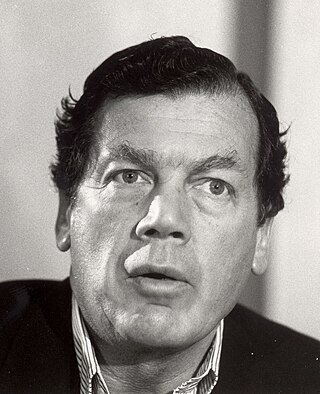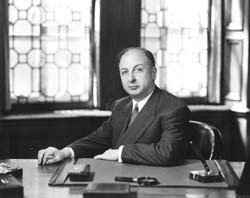Related Research Articles

Canadian whisky is a type of whisky produced in Canada. Most Canadian whiskies are blended multi-grain liquors containing a large percentage of corn spirits, and are typically lighter and smoother than other whisky styles. When Canadian distillers began adding small amounts of highly-flavourful rye grain to their mashes, people began demanding this new rye-flavoured whisky, referring to it simply as "rye". Today, as for the past two centuries, the terms "rye whisky" and "Canadian whisky" are used interchangeably in Canada and refer to exactly the same product, which generally is made with only a small amount of rye grain.

The Seagram Company Ltd. was a Canadian multinational conglomerate formerly headquartered in Montreal, Quebec. Originally a distiller of Canadian whisky based in Waterloo, Ontario, it was in the 1990s the largest owner of alcoholic beverage lines in the world.

Edgar Miles Bronfman was a Canadian-American businessman. He worked for his family's distilled beverage firm, Seagram, eventually becoming president, treasurer and CEO. As president of the World Jewish Congress, Bronfman is especially remembered for initiating diplomacy with the Soviet Union, which resulted in legitimizing the Hebrew language in the USSR, and contributed to Soviet Jews being legally able to practice their religion, as well as immigrate to Israel.
Charles Bronfman, is a Canadian-American businessman and philanthropist and is a member of the Canadian Jewish Bronfman family. With an estimated net worth of $2.5 billion in 2023, Bronfman was ranked by Forbes as the 1,217th wealthiest person in the world.

Edgar Miles Bronfman Jr. is an American businessman, filmmaker, theater producer, and media executive who is a managing partner at Accretive LLC, a private equity firm focused on creating and investing in technology companies. He previously was CEO of Warner Music Group from 2004 to 2011 and as Chairman of Warner Music Group from 2011 to 2012. In May 2011, the sale of WMG was announced; Bronfman would continue as CEO in the transaction. In August 2011, he became Chairman of the company as Stephen Cooper became CEO. Bronfman previously was CEO of Seagram and vice-chairman of Vivendi Universal. Bronfman Jr. expanded and later divested ownership of the Seagram Company, and also worked as a Broadway and film producer, and songwriter under the pseudonyms Junior Miles and Sam Roman. He is chairman of FuboTV.

Samuel Bronfman, was a Canadian businessman, philanthropist, and member of the Canadian Bronfman family. He founded Distillers Corporation Limited and purchased the Seagram Company, that became the world’s largest liquor distilling firm.

Phyllis Barbara Lambert is a Canadian architect, philanthropist, and member of the Bronfman family.

Crown Royal, originally known as Seagram's Crown Royal, is a blended Canadian whisky brand created by Seagram and owned by Diageo since 2000. Production of Crown Royal is done at Gimli, Manitoba, while the blending and bottling of the whisky are done in a facility in Amherstburg, Ontario.
Edward Maurice Bronfman, was a Canadian businessman, philanthropist, and member of the Bronfman family.
Joseph Emm Seagram was a Canadian distillery founder, politician, philanthropist, and major owner of thoroughbred racehorses.
Peter Frederick Bronfman, OC was a Canadian businessman and entrepreneur, born in Montreal, and member of the Toronto branch of Canada's wealthy Bronfman family. He attended Selwyn House School in Montreal and the elite Lawrenceville School in New Jersey, one of the oldest prep schools in America, and received his bachelor's degree from Yale University in 1952.
Saidye Rosner Bronfman was a Canadian-Jewish philanthropist. Her husband, Samuel Bronfman (1891–1971), purchased Joseph E. Seagram and Sons Limited, that became the Seagram Company. The family took a leading role in the Canadian-Jewish community.
Bronfman is a surname. The name is Yiddish in origin and originally referred to a dealer in distilled liquor.
Marjorie B. Blankstein, is a fundraiser, community activist and volunteer. Through her mother Rose, she is a member of the wealthy Bronfman family and a niece of Samuel Bronfman.
Edper Investments Ltd. was the primary holding company and investment vehicle for brothers Edward Bronfman and Peter Bronfman between 1959 and 1995. At its peak in the 1980s, and early 1990s, Edper was one of the largest corporate conglomerates in Canada, controlling more than 500 private and publicly traded companies in a complex structure that was estimated to be worth $100 billion, employed more than 100,000 Canadians, and comprised 15% of the total capitalization of the Toronto Stock Exchange.
Cemp Investments was the primary holding company and investment vehicle for, and named after, the four children of Samuel Bronfman: Charles Bronfman, Edgar Bronfman, Aileen "Minda" Bronfman de Gunzburg, and Phyllis Lambert, also known as the Montreal branch of the Bronfman family. Cemp became one of the largest privately owned companies in Canada. At its peak, it controlled tens of billions in dollars of assets in major distilling, commercial real estate development, oil and gas, and entertainment companies across North America.
Joseph Hersch Reinfeld (1891–1958) was a major bootlegger during the Prohibition era in the United States. After prohibition ended, he owned several large liquor import and distribution companies.
The Samuel and Saidye Bronfman Family Foundation is a private Canadian foundation providing grants to support the community sector. The foundation was established in 1952 as a means by which members of the Bronfman family could combine their philanthropic endeavours.
Stephen Rosner Bronfman is a Canadian businessperson, philanthropist, environmental activist and scion of the Bronfman family. He is the Chief Revenue Officer of the Liberal Party of Canada and a senior advisor to Prime Minister, Justin Trudeau. He is also the last male Bronfman to have stayed in the family's ancestral city of Montreal.
Adam Rodgers Bronfman is an American philanthropist and scion of the Bronfman family. He currently serves as President of the Samuel Bronfman Foundation, named in honor of his grandfather, Samuel Bronfman. He is involved in Jewish outreach and advocates “a pluralistic and open Judaism.”
References
- 1 2 3 4 5 6 7 8 9 Curtis, Christopher G. "Bronfman Family". The Canadian Encyclopedia. Archived from the original on October 20, 2013. Retrieved 2021-07-24.
- ↑ "Museum of Jewish Montreal". imjm.ca. Retrieved 2021-07-25.
- 1 2 The Editors of Encyclopædia Britannica. "Seagram Company Ltd.". Encyclopædia Britannica. Retrieved 22 December 2013.
{{cite encyclopedia}}:|last=has generic name (help) - ↑ Weiss, Steven I. (March 11, 2014). "For Centuries, Jews Ruled Poland's Liquor Trade. Why Was That Legacy Forgotten?". Tablet. Retrieved April 10, 2016.
Even the Bronfmans, the world's most famous liquor magnates, couldn't tie their successes in booze to the legacy of Polish Jewry's tavern-keeping: They were originally tobacco farmers from Bessarabia.
- 1 2 Popper, Nathaniel (April 15, 2005). "Keeping Alive a Philanthropic Family Tradition". The Jewish Daily Forward. Retrieved 24 December 2013.
- 1 2 Kandell, Jonathan (22 December 2013). "Edgar M. Bronfman, Who Brought Elegance and Expansion to Seagram, Dies at 84". The New York Times. Retrieved 22 December 2013.
- ↑ "Bronfman Name Meaning & Bronfman Family History at Ancestry.ca®". www.ancestry.ca. Retrieved 2021-07-25.
- 1 2 3 4 5 6 Brink, Graham (2019-07-03). "10 things: Get to know the Bronfman family's rich and storied history". Tampa Bay Times. Archived from the original on 2019-07-03. Retrieved 2021-07-25.
- ↑ "Clare Bronfman sentenced to almost 7 years in prison for offences in NXIVM cult". Archived from the original on 2020-10-01.
- ↑ "The Heiresses and the Cult". Vanity Fair. 2010-10-13. Retrieved 2021-07-25.
- ↑ Who pays for Canada? Taxes and Fairness (PDF). 2018 Annual Conference of the McGill Institute for the Study of Canada (MISC). Montreal, Quebec. February 23, 2018. Retrieved July 25, 2018.
- 1 2 "Max Rady College of Medicine | University of Manitoba". umanitoba.ca. Retrieved 2021-07-25.
- 1 2 "UM Today | A Legacy 95 Years in the Making". Archived from the original on 2018-01-04.
- ↑ "The Rose and Max Rady Jewish Community Center | Jewish Federation of Winnipeg". www.jewishwinnipeg.org. Retrieved 2021-07-25.
- ↑ "About Us". www.rchsd.org. Retrieved 2021-07-25.
- ↑ Madans Welk, Hannah (November 16, 2020). "Lincoln Avenue Capital Issues Wake-Up Call for Affordable Housing". Los Angeles Business Journal.
- ↑ Henerson, Evan (May 27, 2020). "Building Homes, Changing Lives: Lincoln Avenue Capital's Jeremy and Eli Bronfman's Vision for Affordable Housing". Jewish Journal.
- ↑ Prial, Frank J. (June 25, 2006). "'The Bronfmans' by Nicholas Faith: Whiskey Chasers". The New York Times. Retrieved 24 December 2013.
- ↑ Corelli, Adam (February 14, 1993). "Legacy of a bootlegger: Canada's giant Edper conglomerate, created by the outcast cousins of the Bronfman drinks dynasty, is in trouble and may be slipping into unfamiliar hands". The Independent (UK). Retrieved 24 December 2013.
- ↑ Whisky man : inside the dynasty of Samuel Bronfman. OCLC. OCLC 496911520 – via WorldCat.
- ↑ Desjardins, Sylvain-Jacques (March 25, 2004). "Seagram Building reborn as Martlet House". McGill Reporter. 36 (2003–2004). Retrieved 25 December 2013.